|
|
|
Sort Order |
|
|
|
Items / Page
|
|
|
|
|
|
|
| Srl | Item |
| 1 |
ID:
182618
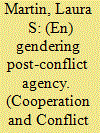

|
|
|
|
|
| Summary/Abstract |
This article explores how female agency and experience manifest in a local Sierra Leonean peacebuilding program known as Fambul Tok. While post-conflict literature, namely transitional justice and peacebuilding, has become more critical in recent years, there is still a tendency to generalize both the ‘local’ and ‘women’. There is, however, much greater scope to delineate how local programs shape and are shaped by women in these settings. While Fambul Tok was, at least theoretically, meant to better align with the needs and priorities of Sierra Leoneans, including women, the empirics suggest that female engagement ultimately results in a wide range of outcomes, which are not necessarily more ‘empowering’, ‘transformative’ or ‘good’ than international programs. Drawing on original empirical data from Fambul Tok, this article highlights the complexity of gendered power relations within these programs and how individual women have multiple, diverse and contested forms of agency and experiences within local settings.
|
|
|
|
|
|
|
|
|
|
|
|
|
|
|
|
| 2 |
ID:
173918
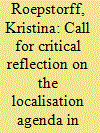

|
|
|
|
|
| Summary/Abstract |
Calls for a greater inclusion of local actors have featured for some time in debates on how to make humanitarian action more efficient and address unequal power relations within the humanitarian system. Though the localisation agenda is at the core of current reform efforts in the humanitarian sector, the debate lacks a critical discussion of underlying assumptions – most strikingly, the very conceptualisation of the local itself. It is argued that the current discourse is dominated by a problematic conceptualisation of the local in binary opposition to the international, leading to blind spots in the analysis of exclusionary practices of the humanitarian sector. As such the localisation agenda risks perpetuating the very issues it wants to redress. A critical localism is thus proposed as a framework for much needed research on the localisation agenda.
|
|
|
|
|
|
|
|
|
|
|
|
|
|
|
|
| 3 |
ID:
164029
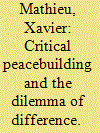

|
|
|
|
|
| Summary/Abstract |
Recent research has revealed the need to include and understand local actors in order to improve the effectiveness of peacebuilding. According to these analyses, peacebuilding could become more respectful of cultural differences thanks to a genuine engagement with the specificities of the local. Empirical studies of the ‘different’ local have thus flourished in the field with the ambition of countering the universalist tendency of traditional peacebuilding. Through the use of the concept of ‘dilemma of difference’, this article challenges this intuitive argument and argues that these approaches risk reproducing a stigma attached to the ‘different’ local. Indeed, emphasising difference in order to ensure its respect means separating and reifying ‘it’ as a deviation from the norm(al). As such, this analytical strategy is likely to recreate the stigma that contributed to the exclusion of local actors in previous peacebuilding practice and research. In contrast, I outline three strategies for studying difference differently in peacebuilding: focusing on the institutional arrangements that enabled specific differences to emerge and become visible; recognising that these differences are internal to peacebuilding (and thus an unlikely source of alternative and emancipation); and revealing the unstated and implicit Self for/from whom local difference is relevant.
|
|
|
|
|
|
|
|
|
|
|
|
|
|
|
|
| 4 |
ID:
126662
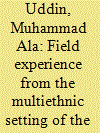

|
|
|
|
|
| Publication |
2013.
|
| Summary/Abstract |
Conducting research in the home country brings diverse experiences to a researcher as the researcher is considered as both insider and outsider by the informants. I conducted fieldwork in the Chittagong Hill Tracts - a multiethnic setting situated in the southeastern part of Bangladesh - where I was considered both insider and outsider. In the light of such experiences, in this article I discuss the researcher's position and the level of engagement - how a researcher situates himself or herself in the field and gathers information from different people. This article also discusses briefly the methodological procedures of the study.
|
|
|
|
|
|
|
|
|
|
|
|
|
|
|
|
| 5 |
ID:
139669
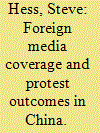

|
|
|
|
|
| Summary/Abstract |
By looking at the case of the 2011 Wukan rebellion in Guangdong Province, the following article explores the role played by foreign media in influencing the protest’s ultimate outcome: an intervention from above by provincial authorities in favour of the villagers. Placing Wukan into a four-level model incorporating local, provincial, national, and international dimensions, this article considers howWukan might serve as a model for contention that may influence future acts of popular protest in China in the digital age. It suggests that while appealing directly to foreign media can help claimants increase their leverage over local officials and prompt interventions from above, such actions are likely to modify and accelerate, but not fundamentally transform, existing patterns of localized, community-specific acts of contention seen earlier in the Reform Era.
|
|
|
|
|
|
|
|
|
|
|
|
|
|
|
|
| 6 |
ID:
141460
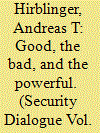

|
|
|
|
|
| Summary/Abstract |
This article argues for a reflexive perspective on the ‘local’ in peacebuilding. While it is now widely acknowledged that anything local is complex, unstable, and relational, scholars continue to make truth claims about local actors and practices. This leads to an incomplete account of peacebuilding, as it conceals the powerful effects of representation, which shape our perspective on the local. We argue that the local is both used and produced through practices of representation, and that these representations serve to define what good peacebuilding entails. We consequently suggest a perspective on perspectives, which focuses on how representations of the local relate to political agendas in peacebuilding, and which can account for the effects of choosing one mode of representation over another. Through case studies from Burundi and South Sudan, we show that representations of the local are conflictingly produced by scholars, practitioners, and government officials, telling about the true, the good, and the bad local, empowering some and disempowering other actors, institutions, and practices. These dynamics have tangible effects on peace, conflict, and (in)security.
|
|
|
|
|
|
|
|
|
|
|
|
|
|
|
|
| 7 |
ID:
141779


|
|
|
|
|
| Summary/Abstract |
This article argues for a reflexive perspective on the ‘local’ in peacebuilding. While it is now widely acknowledged that anything local is complex, unstable, and relational, scholars continue to make truth claims about local actors and practices. This leads to an incomplete account of peacebuilding, as it conceals the powerful effects of representation, which shape our perspective on the local. We argue that the local is both used and produced through practices of representation, and that these representations serve to define what good peacebuilding entails. We consequently suggest a perspective on perspectives, which focuses on how representations of the local relate to political agendas in peacebuilding, and which can account for the effects of choosing one mode of representation over another. Through case studies from Burundi and South Sudan, we show that representations of the local are conflictingly produced by scholars, practitioners, and government officials, telling about the true, the good, and the bad local, empowering some and disempowering other actors, institutions, and practices. These dynamics have tangible effects on peace, conflict, and (in)security.
|
|
|
|
|
|
|
|
|
|
|
|
|
|
|
|
| 8 |
ID:
163055
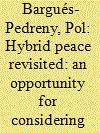

|
|
|
|
|
| Summary/Abstract |
Critical peacebuilding scholars have focused on the impact of the encounter between the ‘local’ and the ‘international’, framing the notion of ‘hybridity’ as a conceptual mirror to the reality of such encounter. This paper explores a dual aspect of hybridity to highlight a tension. Understood as a descriptor of contingent realities that emerge after the international–local encounter, hybridity requires acknowledging that peacebuilders can do little to shape the course of events. Yet, framed as a process that can enable the pursuit of empowering solutions embedded in plurality and relationality, hybridity encourages forms of interventionism that may perpetuate the binaries and exclusions usually associated to the liberal peace paradigm. The paper suggests that when hybridity is used to improve peacebuilding practice, an opportunity may be missed to open up this tension and analytically discuss options, including withdrawal which, whilst largely left out of the conceptual picture, may be relevant to calls for reclaiming the self-governance of the subjects of peacebuilding themselves.
|
|
|
|
|
|
|
|
|
|
|
|
|
|
|
|
| 9 |
ID:
161770
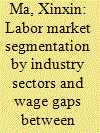

|
|
|
|
|
| Summary/Abstract |
This paper explores the influence of labor market segmentation by industry sectors on the wage gap between rural-to-urban migrants and local urban residents in China in the 2000s. Using Chinese Household Income Project (CHIP) survey data and the results based on the Brown decomposition method, the results indicate that the influence of intra-industrial differentials is greater than the influence of inter-industry differentials in both 2002 and 2013. The influence of the explained component of the intra-industry differentials is larger in both 2002 and 2013, and the influence of the unexplained component of the intra-industrial differentials rises steeply from 2002 to 2013. These results show that the individual characteristic differentials (e.g. human capital) in the same industry sector is the main factor causing the wage gap in both 2002 and 2013, and the problem of discrimination against migrants in the same industry sector became more serious from 2002 to 2013.
|
|
|
|
|
|
|
|
|
|
|
|
|
|
|
|
| 10 |
ID:
157984
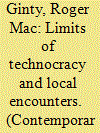

|
|
|
|
|
| Summary/Abstract |
This article is the conclusion to a special issue that examines the European Union (EU), peacebuilding, and “the local.” It argues that technocracy—particularly EU technocracy—shapes the extent to which local actors can hope to achieve ownership of externally funded and directed peace support projects and programs. Although some actors within the EU have worked hard to push localization agendas, a number of technocracy linked factors come together to limit the extent to which the EU can truly connect with the local level in its peace support activities. While the EU and other international actors have invested heavily into capacity building in conflict-affected contexts, the EU’s own capacity has not necessarily been built to address the scalar problem of accessing the local in ways that are meaningful.
|
|
|
|
|
|
|
|
|
|
|
|
|
|
|
|
| 11 |
ID:
157982
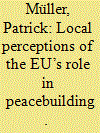

|
|
|
|
|
| Summary/Abstract |
Perception research can make a valuable contribution to the study of the local dimension in EU peacebuilding. The conceptual framework developed in this article distinguishes between perceptions of the “legitimacy,” “effectiveness,” and “credibility” of EU peacebuilding practices, which are crucial factors for successful peacebuilding. Relying on the case of the EU’s support for security sector reform (SSR) in Palestine, this article shows that local stakeholders—which participate in various EU-sponsored training and capacity-building programs—display considerable support for liberal peacebuilding norms. Yet, perceived discrepancies between the EU’s peacebuilding rhetoric and its SSR activities have severely undermined the potential of the EU’s liberal peacebuilding model in the eyes of Palestinian stakeholders. Critical local perceptions are frequently articulated with reference to the EU’s own liberal peacebuilding discourse, pointing to a lack of inclusiveness of the SSR process and deficits in terms of democratic governance and the rule of law.
|
|
|
|
|
|
|
|
|
|
|
|
|
|
|
|
| 12 |
ID:
093166
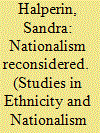

|
|
|
| 13 |
ID:
171159
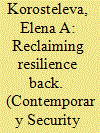

|
|
|
|
|
| Summary/Abstract |
Resilience seems to have become “the everyday” covering many aspects of our lives and the policy agenda of major international institutions. However, despite the upsurge in its popularity, are we sure we understand resilience well enough to make full use of its potential? Is resilience just about an entity and its qualities, the knowledge of which could help us improve its response to adversity? Or is it more about resilience as governance-thinking which could enable local communities to self-organize to build life they have reason to value, with external assistance as necessary? Tackling these fundamentals is important, not least to ensure that resilience is not another buzzword but an opportunity to make governance more adaptive. This article argues that resilience cannot be engineered externally, and requires local communities, aware of their own strength and capacities, to actualize their own potential in their strife for “good life,” the way they specify.
|
|
|
|
|
|
|
|
|
|
|
|
|
|
|
|
| 14 |
ID:
181419
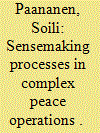

|
|
|
|
|
| Summary/Abstract |
This article examines sensemaking in complex peace operations. The article’s key argument is that adaptation to ‘the local’ and its complexity requires sensemaking, and that sensemaking helps to disrupt conflict dynamism and prevent conflicts. The study’s theoretical underpinnings are linked to the concept of sensemaking and its further development. The findings are based on eleven in-depth interviews with commanders who have concrete command experience in peace operations. The research findings describe four processes – sensegiving, sensebreaking, sensedrawing and sensekeeping – that are part of the sensemaking entity. Each process entails practices in which sense is embedded, negotiated and regenerated to be shared, in order to work with change, adapt to local necessities and sustain peace. Theoretically, the article contributes to the existing understanding of complex, ongoing and longstanding crises in general and adaptive and proactive sensemaking, in which ‘the local’ is emphasized, in particular.
|
|
|
|
|
|
|
|
|
|
|
|
|
|
|
|
| 15 |
ID:
091428
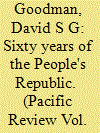

|
|
|
|
|
| Publication |
2009.
|
| Summary/Abstract |
Although the People's Republic of China turns 60 in 2009, popular and to some extent academic perceptions of its political system remain over-determined by the experience of its first 30 years. The socio-economic impact of the policies of the last three decades is well recognised but not the context in which these have occurred. In particular, there is a tendency to differentiate sharply between dramatic economic growth and its consequences and the lack of political change. While it is clearly the case that the Chinese Communist Party remains in power it is equally as obvious that economic reform has had and been accompanied by major political change. Studies on the state in transition at local levels certainly suggest that change has been significant. Moreover, these local studies also indicate the need to further conceptualise understanding of the state in China. The state idea is rather too general a concept and too blunt an instrument for analysis compared to research that considers the state's values and ideology, the social base of political power, the structures and processes of the political system, the authoritative decision-makers, bureaucracy and administration, and the state's international interactions.
|
|
|
|
|
|
|
|
|
|
|
|
|
|
|
|
| 16 |
ID:
112384
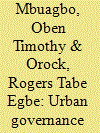

|
|
|
|
|
| Publication |
2012.
|
| Summary/Abstract |
The democratic impulse that spurred a wave of political and economic reform policies in Cameroon in the 1990s appears to have witnessed a reversal. This is the case with urban governance policies. The imposition of state-appointed city administrators on locally elected mayors and councillors in contradiction to the aspirations of citizens has not augured well for local democratic practices. This interventionist drive by the state in the process of local democratization effectively excludes a considerable segment of urban residents from local governance proceedings. To understand the effects of these politically motivated policies on city politics in Cameroon, this paper draws from broad historical data, local press reports, and close observation of on-going development initiatives in the city of Kumba. This is done against the backdrop of persistent structural and political problems associated with the failure of city councils in Cameroon to provide meaningful and consistent service delivery such as garbage disposal. This paper concludes that sustainable urban development in Cameroon could be based on trust that embraces and cuts across all stakeholders within urban municipalities.
|
|
|
|
|
|
|
|
|
|
|
|
|
|
|
|
|
|
|
|
|